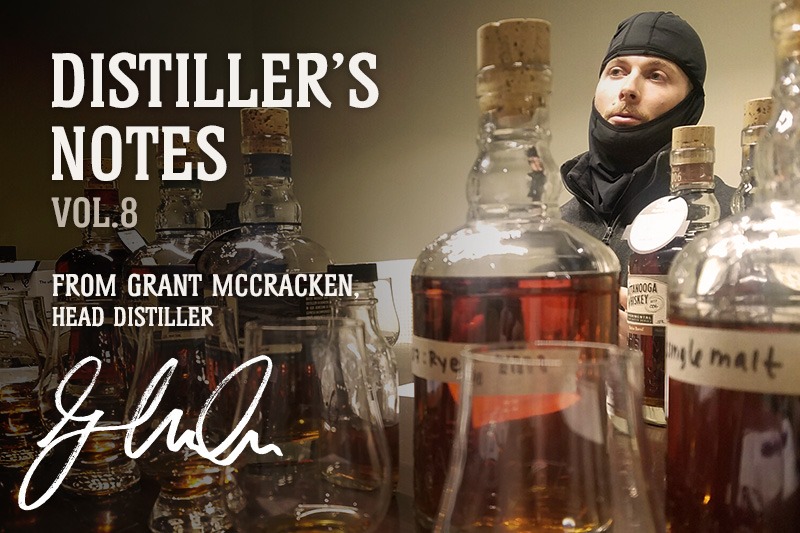
Distiller’s Notes Vol.8: Love, in your own terms
Citizen Kane is widely regarded as the best movie of all time…but I gotta say…it’s not for everybody.
Now, listen closely and you might hear Orson Welles rolling in his grave.
A couple weeks back, my wife and I sat down and turned on the film for the very first time. Within minutes, I could tell she was looking in my direction; she was already tired of it. I tapped the screen and pointed out that we were only 17 minutes in. I referenced the cinematography and time-traveling plot line – both ahead of their time for 1941. And then…I got tired too.
No matter how beautiful it all was, Welles was starting to lose me; the rapid-fire dialogue and “everything is important” focus became exhausting. I could barely keep up. Not too long after I defended the movie, I tapped the screen again. Only 30 minutes in. Wow. She was right, this wasn’t for everybody.
If you’ve never seen the movie, here’s a quick synopsis:
Family gets rich and sends their boy – Charles Foster Kane – away to boarding school, against his will. Kane grows up and finds “purpose” in the newspaper business – saying he wants to stick up for ordinary people. Goes on to build a fake news empire. Begins collecting expensive statues for no apparent reason. Gets married, has a son, loses touch with family but seems too busy to care. Runs for governor, has an affair and loses the race and his marriage because of it. Remarries and buys second wife everything – including an opera house and a massive castle. Wife accuses him of trying to buy her love and he gets upset, because it’s true. Trashes wife’s bedroom, finds a snow globe in the process, whispers “Rosebud” and dies. Everyone is left asking, “who or what is ‘Rosebud’?” Reporter searches for answers.
Although Kane’s life is an interesting tale, it’s the search for “Rosebud” that becomes the focus of the film. In that search, we find that everyone’s interpretation of Kane’s life is a little different, and that all of them are probably some form of inaccurate. As these same people posthumously parse through his endless collection of meaningless things – one thing was for sure – Kane was rolling in his grave.
Time to go to bed.
Growing up, I watched my dad hunt for and collect things. Sometimes antiques, sometimes hardware for a project, sometimes a special beer or whiskey. He never had a massive whiskey collection – just enough to know he liked it.
When I was younger, I looked at all the little brown statues – “They all look the same!”, I used to think. But there was a personal story behind each one; and he was going to tell you about it 10 more times before you reminded him that you “heard this one before”.
By the time I realized I might actually be interested in whiskey, I was too far from home to dig through my dad’s cabinet anymore. I probably could have called him and asked him where to start…but I was too busy doing my own thing. Instead, I decided to buy the all-time best book on single malt: Michael Jackson’s Complete Guide to Single Malt Scotch. This wasn’t the Michael Jackson with the glove; this was the godfather of beer and whiskey writing – the original “beer hunter”. If there was one place to find out what a whiskey tasted like without even taking a sip, it was probably in this book. Who else could describe a whiskey as a “bear hug” and make it sound delicious? I ended up buying a bottle of “bear hug” on those two words alone; had a drink and stuffed it away in my cabinet.
Growing up, I watched my mom work in the kitchen – working slowly, checking the recipe twice and talking out loud. Something she always loved: reverse engineering a recipe she tasted at a restaurant. I watched her whisper to her friend what they thought was in it. ”I think we can make this!”, she’d smile and say.
“Why would you do that, when you can buy it here?”, I thought.
By the time I realized I might actually want to figure out how to use an oven, I was too far from home to ask my mom for help. I could’ve called…but I was too busy doing my own thing. Instead, I bought the all-time best book on bread-baking: Peter Reinhart’s Bread Baker’s Apprentice. I started at the front, and chipped away at each razor-sharp, “everything is important” recipe. Eventually, I made it to the “ryes”…but Reinhart was starting to lose me. The density of the rye fought against the proper rise. And if you go with a pumpernickel grind – good luck with that. But time it all right, and it could be perfect.
Somewhere around that time, I became a new father – and sadly – was lured away by my job. There, I helped work on a rocket-fuel-strong barley-wine that seemed to always be screaming for my attention. I fed and monitored it at all hours. I was anxious. I was tired. Shouldn’t I be doing this at home with my own child? I zombie-walked through the brewery one day and heard some chatter by the fermenter. A couple of fellow brewers were looking at the vent arm on the tank. The beer was still fermenting, but at this point was so strong it dripped a malty distillate off the vent, just like a pot still. I paused.
“This might be the rarest and greatest single malt of all time”, “I should call my dad and tell him what I found”.
But I never did. That day – like most days – I needed to eat and run. Across the street was a small deli with a rotating list of sandwiches, made with bread from a great little bakery down the road. I rushed over, hearing that their Reuben with Russian dressing was on the menu. It was made on grilled Pumpernickel Rye – “Ooooh baby”. I ran over, bought the sandwich and walked back over to the brewery, eating the sandwich from the greasy paper wrapper as I walked.
“What’s in this?”, “Molasses?”, “How much cocoa powder?”, “I bet mom could figure it out”, “Maybe I’ll call her to let her know what I found”.
But I never did.
I walked into the break room and realized I’d eaten the sandwich too fast – just like my dad always did. I noticed that the rye was a little too dense to go down my throat – this kind of thing always happened to my mom. Needing just a little water to wash it all down, I went to the sink, filled a cup and took a gulp. The water dumped into my throat, but the rye – like a glucanous dam – blocked its flow…and now my airway. I wasn’t exactly choking, but it sure felt like I was.
“Stay calm, it’ll be fine”, I thought.
I looked at the one other person in the breakroom: Stu. This was awkward. I didn’t really know the guy, but the rye wasn’t going anywhere and I was beginning to realize I needed help. I nervously gave him the international sign for “I’m not choking, but it sure feels like I am”.
“You’re choking!?”, he yelled.
“Here we go”, I thought.
He rushed around me to give me the Heimlich. I’d never gotten one of these before, and by the feel of it, he’d never given one either. Great – two Heimlich virgins. He squeezed me in some sort of bear hug. Was this the standard Heimlich or the bear-y style version? I scanned the room, hoping to see a safety handout that might illustrate the proper technique. Nothing.
“This might be it”, I thought.
Then, a realization of all the regrets and missed connections: “This can’t be how it ends!”, “Call your parents!”, “Tell them what you’re up to!”, “Tell them you love them!”, “Be the father and husband you want to be!”.
Suddenly, something happened – the rye mash in my throat dislodged and spewed across the room.
I gasped for air.
Stu yelled something triumphant and obscene.
I bent over and my chest heaved, breath after breath.
I went to the sink, spit up what remained of pumpernickel, turned around and hugged Stu. How do you say thanks to someone for saving your life? Say it again.
I went home that night in a bewildered state, opened up the liquor cabinet and saw my lone bottle of whiskey inside: here all the while, waiting for me to reach out. How do you thank someone for saving your life? A single malt? No, a “bear hug”.
By the end of Citizen Kane, we see a man isolated and alone, still searching for love on his own terms. Then, in his confusion and rage, he uncovers a memory in the form of a snow globe: a reminder of his idealized youth, and a sled called “Rosebud”.
Even if you think you have nothing in common with this man, by the end of the movie you realize every person’s potential to become something like him: trapped, alone and clinging to a memory in a snow globe. What if he was able to tell someone the story of these memories a long time ago? Would he have ended up a better man for it? We’ll never know.
All the symbols aside, I can’t help but remind myself of what I already knew before this movie:
If there’s one thing my dad taught me, it’s that collecting things means nothing unless you share the experience of finding them with the ones you love.
If there’s one thing my mom taught me, it’s how to memorialize these things by reconstructing your own version of them, in their honor.
But I suppose if there’s one thing I learned one thing from Charles Foster Kane, it’s to do these things right now, before you end up whispering about them to someone who has no idea what you’re talking about.

